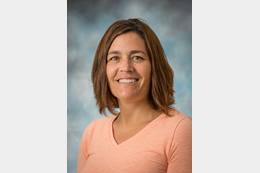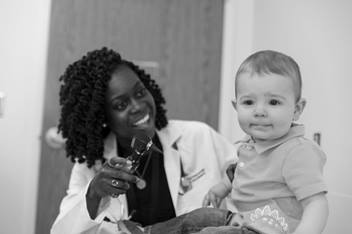Pediatricians as Child Advocates: A Conversation With Dr. Sara Bode

Sara Bode, MD, is the medical director for Nationwide Children’s Hospital’s expansive school-based health program; the medical consultant for Columbus City Schools; and chair-elect of the American Academy of Pediatrics’ Council on School Health.
Sara Bode, MD, has long been an advocate for children, but during the COVID-19 pandemic, she became one of the most sought-after voices on the intersection of children’s health and education – turned to as an expert by The New York Times, USA Today, Good Morning America and Time magazine, among many others.
Dr. Bode is the medical director for Nationwide Children’s Hospital’s expansive school-based health program; the medical consultant for Columbus City Schools; and chair-elect of the American Academy of Pediatrics’ Council on School Health.
But she is also a primary care pediatrician. It was her experience treating children one by one, getting glimpses into their lives, that showed her how important it was to become involved in advocacy work that goes beyond her office walls.
Dr. Bode is the lead author of a recent publication in the journal Pediatrics calling for health care organizations to put greater value on individual physicians’ advocacy work, including using it when considering career advancement. Nationwide Children’s is one of the few health care organizations in the country that do this now, and Dr. Bode herself was recently promoted, in part because of her significant advocacy efforts.
She sat down with the Collaboratory to discuss these issues.
Collaboratory: How did you get drawn to the advocacy work you do now?
Dr. Bode: I had good quality, traditional medical training, and I focused on what I should – the different diseases kids get and how to treat them. I wanted to make sure I was the best clinician I could be.
But before I came to Nationwide Children’s, I started to notice a big disconnect between the amazing facilities a hospital might have and the health outcomes of the community that might even be within walking distance of those amazing facilities. In one case, at a previous hospital, there were neighborhood children trying to break into the hospital’s locked playground. Simply because there was no other place for them to go.
One of my first advocacy jobs as a pediatrician was meeting community members and helping build a safe community program for those kids.
Collaboratory: Is that kind of story why so many pediatricians end up being child advocates?
Dr. Bode: As pediatricians, we get this gift and responsibility of seeing into the daily lives of families. We get to hear about their triumphs and the struggles. We are the witnesses to what is working and not working for these families. We are the witnesses, so we can help tell the stories to make sure laws or programs meet the needs.
We know there are so many things that will tell you whether a kid will be healthy other than what you do in the office or the hospital. I can see a kid in the office for all their well checks, and I can treat their ear infections, but if I’m not setting up a system that makes sure that kid is in a safe and supportive environment, has enough food, stable housing and a good education, they might still have a really bad outcome.
Collaboratory: Have hospitals traditionally thought of advocacy as important?
Dr. Bode: It hasn’t been featured as much as it should over the years from hospital systems, but they are now understanding that they have to put more investment in this work in order to move the needle and actually make the community healthier. Nationwide Children’s Hospital, in particular, has really been a leader in that space, with all the work they have done around community wellness. It’s thinking about how we are investing as a hospital and as individual doctors into the community.
Collaboratory: Is there resistance to pediatricians doing advocacy work?
Dr. Bode: I don’t think it’s resistance, it’s just a lack of awareness of all the roles they can play and how they can help. A pediatrician could be a great advocate on a school board. We have pediatricians in state legislatures.
From a doctor’s standpoint, it’s an issue of how that work is valued and rewarded. Pediatricians need to be able to have the time and space for these efforts. A hospital system has to value that so they give doctors time to do that work. How pediatricians traditionally make money is to see kids in the office or the hospital. We don’t bill for our other community work.
Collaboratory: Do you see more interest in advocacy work from medical trainees and residents than you used to?
Dr. Bode: We see a huge interest. When we have people come to interview to start their residencies, it’s one of the first questions we get: what training do you have for me around advocacy? I co-direct a program for residents on advocacy. At the same time they are learning what medicines to use, they are also going out into the community and learning how to do system-based work.
Medical students now understand that unless we address social determinants of health, we’re not going to reach our goals.
Collaboratory: How has Nationwide Children’s become a leader both in advocacy and in recognizing the importance of their staff members as advocates?
Dr. Bode: There are a few reasons. Our accountable care organization, Partners For Kids, is fully financially at risk for the health of children in our area covered my Medicaid managed care plans. We want children to be healthier; we don’t just want to provide medical services for them. It’s one of the reasons we can use non-traditional ways to measure success.
At this point, the hospital has been invested in the community for many years. Nationwide Children’s has decided that community investment is one of the best ways we can lead as a hospital.
Collaboratory: Have you gotten feedback about your publication from colleagues around the country?
Dr. Bode: So much. We have webinars coming up on how to put advocacy language into the promotions process because so many institutions haven’t done it yet. It’s a big undertaking for hospitals.
I think everyone gets it. Pediatricians become pediatricians because they want to help. Finding a way to make advocacy rewarding for the physician and the hospital is something others want to do across the United States.


